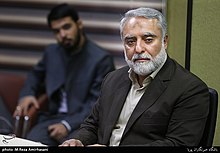Mohammad Rajabi Davani

Mohammad Rajabi Davani, portrait and close up of a photo of Mohammed Reza Amirhasani, on the occasion of the presentation of the Book of Curses and Missions to the Hadith of Ghadir in the presence of Ayatollah Saeed Shah Abadi, Director of the Ghadirology Institute, Mohammad Hussein Rajabi Dawani, faculty member of the Imam Hussein University, and Hojatoleslam Majid Reza Fouladi, General Director of Approximation of Religions Publications
Mohammad Rajabi Davani ( Persian محمدحسین رجبی; * 1961 in Qom ) is an Iranian , the Shiite theology specialized Islamic scholar and diplomat.
He is the son of Ali Davani and brother of Fatemeh Rajabi and Mohammad Hassan Rajabi. He is a professor of Islam at Imam Sadiq University.
Career
He joined the foreign service and was cultural attaché in Berlin from 2004 to 2010. From June 5, 2013 to 2016, he was ambassador to Sarajevo .
Biographer of Ruhollah Khomeini
In 1990 he published زندگينامه سياسى امام خمينى: از آغاز تا هجرت به پاريس Imam Khomeini's political biography: From the Beginning to emigrate to Paris for the 1966 published work " welayat-e Faqih (Islamic rule), the main text of Ruhollah Khomeini claimed Rajabi Davani the following motives:
"
- ) Khomeini started the main work when the clergy were not showing any major anti-colonial activities. This is intended to justify the agitational character of the book.
- ) This book was the only work that, after the overthrow of Resa-Khan-Pahlavi, dealt in his popular language with the question of Islamic leadership and rule.
- ) Most of the political writings written during this period would have argued either Marxist or nationalist.
- ) Because of the anti-religious politics of the Pahlavis, the clergy would hardly have learned anything about the political ideas of the Third World movement. He explains the activities of the fundamentalist movements of the "Akhawanol Muslims" in Egypt, which arose as a reaction to the establishment of the state of Israel, thus giving an indication of the influences of these movements on Khomeini.
- ) Khomeini exposed the colonial machinations against Islam in his main work.
- ) In his work, Khomeini invited people to return to Islamic identity. This should be understood as a revolution in the world of thought and Islamic politics, which mandated the Islamic clergy to establish Islamic rule. Hence the "Imam" formulated the general idea of Islamic rule.
- ) Khomeini's ideas of Islamic rule are not influenced by Western ideas such as constitutionalism and are based on Islamic laws.
- ) Welayate Faqih, the rule of the clergy, is based on the idea of absolute divine rule and must be understood as a counter-position to the deficient human conception of man. Human ideas would only follow materialistic or group interests. "
- Imam Khomeini's political biography: From the beginning to the emigration to Paris, quoted in The Islamic Republic of Iran: the rule of political Islam as a variety of totalitarianism, 2003,
Publications
- Kufa and its role in the early Islamic centuries
- Analytical History of the Imamate Era, Amir al-Momenin Ali
- Military support in the early Islamic armies
Individual evidence
-
↑
 Disclosure of the Book of Curses and Missions to the Hadith of Ghadir with the Presence of Ayatollah Saeed Shah Abadi, Director of the Ghadirology Institute, Mohammad Hussein Rajabi Dawani, faculty member of Imam Hussein University and Hojatoleslam Majid Reza fouladi, Director General of Approximation of Religions Publications
Disclosure of the Book of Curses and Missions to the Hadith of Ghadir with the Presence of Ayatollah Saeed Shah Abadi, Director of the Ghadirology Institute, Mohammad Hussein Rajabi Dawani, faculty member of Imam Hussein University and Hojatoleslam Majid Reza fouladi, Director General of Approximation of Religions Publications - ↑ Helge Sobik, Report on the Persian Gulf: sand to gold, desert to money, [1] ; Evangelical Academy Loccum , [2]
- ↑ Iran advocates international peace: Iranian Ambassador to Bosnia Hossein Rajabi, The Iran Project , [3]
- ↑ Khomeini, Ruhollah. Iran - Politics and government - 1925-1979. [4]
- ↑ Wahied Wahdat-Hagh, The Islamic Republic of Iran: The Rule of Political Islam as a Variety of Totalitarianism, 2003, p. 195
- ↑ worldcat.org, [5]
| predecessor | Office | successor |
|---|---|---|
| Gholamreza Yousefi | Iranian ambassador he was ambassador to Sarajevo , ( Federation of Bosnia and Herzegovina ) June 5, 2013 to 2016 |
Mahmoud Heidari |
| personal data | |
|---|---|
| SURNAME | Rajabi Davani, Mohammad |
| ALTERNATIVE NAMES | سید حسین رجبی |
| BRIEF DESCRIPTION | Iranian scholar of Islam |
| DATE OF BIRTH | 1961 |
| PLACE OF BIRTH | Qom |